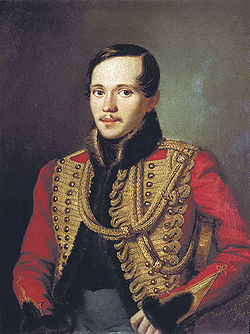
Death of the Poet
Encyclopedia
"Death of the Poet" is an 1837 poem by Mikhail Lermontov
, written in reaction to the death of Alexander Pushkin.
Pushkin was mortally wounded in a duel on January 27, 1837, and died on the 29th. Lermontov began his first formulation of the poem (ending with the phrase "...his lips forever sealed") as soon as he heard of the event, and within a short time copies of the poem began to be circulated in St. Petersburg.
Within days the doctor Nikolai Arendt visited Lermontov (who was ill) and told him the details of the death of Pushkin, whom Arendt had tried to save. Arendt's story likely influenced Lermontov's development of the poem.
Pyotr Vyazemsky
described the reaction of Arendt to the death of Pushkin:
 On February 7, Lermontov added an acerbic final sixteen lines (beginning "And you, the arrogant descendants of infamous scoundrels...") to the poem. These lines called for divine justice upon the heads of the "greedy horde" of the court aristocracy, whom Lermontov condemned as executioners of freedom and the true culprits of the tragedy. Hand-written copies of this version of the poem circulated among the Petersburg intelligentsia and came to the attention of the authorities. Those final sixteen lines were regarded by the authorities as seditious free thinking
On February 7, Lermontov added an acerbic final sixteen lines (beginning "And you, the arrogant descendants of infamous scoundrels...") to the poem. These lines called for divine justice upon the heads of the "greedy horde" of the court aristocracy, whom Lermontov condemned as executioners of freedom and the true culprits of the tragedy. Hand-written copies of this version of the poem circulated among the Petersburg intelligentsia and came to the attention of the authorities. Those final sixteen lines were regarded by the authorities as seditious free thinking
, and Lermontov was arrested. After a brief investigation he was, on the orders of the Emperor Nicholas I
, exiled to a regiment in the Caucasus on February 25.
The poem was only published long after Lermontov's death. The first publication (a German translation under the title "Lermontov's lament at the grave of Alexander Pushkin") was in 1852 in Friedrich von Bodenstedt's Mikhail Lermontoff's Poetic Legacy. The first published English translation (under the title "On the death of Pushkin") was in 1856, in in Alexander Herzen
's London periodical Polar Star.
Mikhail Lermontov
Mikhail Yuryevich Lermontov , a Russian Romantic writer, poet and painter, sometimes called "the poet of the Caucasus", became the most important Russian poet after Alexander Pushkin's death in 1837. Lermontov is considered the supreme poet of Russian literature alongside Pushkin and the greatest...
, written in reaction to the death of Alexander Pushkin.
Pushkin was mortally wounded in a duel on January 27, 1837, and died on the 29th. Lermontov began his first formulation of the poem (ending with the phrase "...his lips forever sealed") as soon as he heard of the event, and within a short time copies of the poem began to be circulated in St. Petersburg.
Within days the doctor Nikolai Arendt visited Lermontov (who was ill) and told him the details of the death of Pushkin, whom Arendt had tried to save. Arendt's story likely influenced Lermontov's development of the poem.
Pyotr Vyazemsky
Pyotr Vyazemsky
Prince Pyotr Andreyevich Vyazemsky or Petr Andreevich Viazemsky was a leading personality of the Golden Age of Russian poetry.- Biography :...
described the reaction of Arendt to the death of Pushkin:

Freethought
Freethought is a philosophical viewpoint that holds that opinions should be formed on the basis of science, logic, and reason, and should not be influenced by authority, tradition, or other dogmas...
, and Lermontov was arrested. After a brief investigation he was, on the orders of the Emperor Nicholas I
Nicholas I of Russia
Nicholas I , was the Emperor of Russia from 1825 until 1855, known as one of the most reactionary of the Russian monarchs. On the eve of his death, the Russian Empire reached its historical zenith spanning over 20 million square kilometers...
, exiled to a regiment in the Caucasus on February 25.
The poem was only published long after Lermontov's death. The first publication (a German translation under the title "Lermontov's lament at the grave of Alexander Pushkin") was in 1852 in Friedrich von Bodenstedt's Mikhail Lermontoff's Poetic Legacy. The first published English translation (under the title "On the death of Pushkin") was in 1856, in in Alexander Herzen
Alexander Herzen
Aleksandr Ivanovich Herzen was a Russian pro-Western writer and thinker known as the "father of Russian socialism", and one of the main fathers of agrarian populism...
's London periodical Polar Star.

